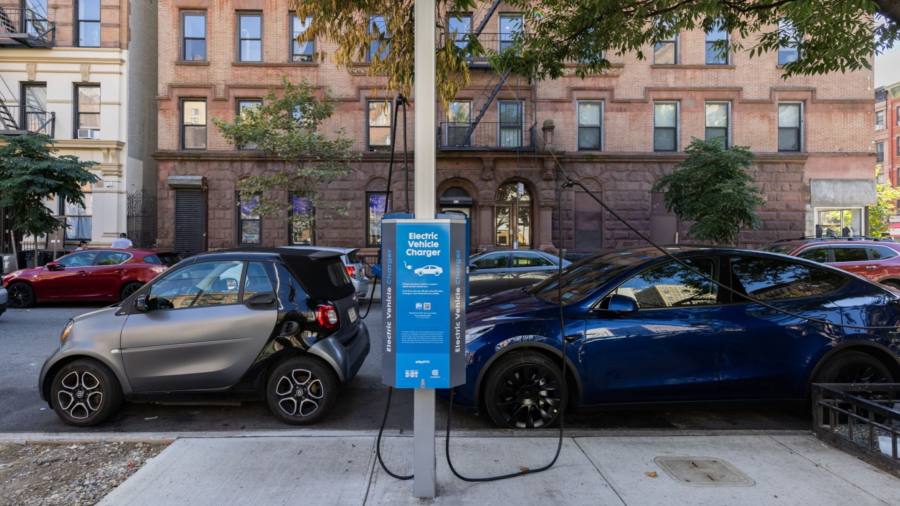For the past few months, our new electric car has worked like a charm. One of the first BMW iX SUVs to hit the US market, it draws compliments from garage attendants and car buffs, and the rapid charger we installed in our garage easily powers it up for the daily commute.
Then we tried to take it on the road. A charging station black hole across much of the Midwest made that route impossible. Then, along the allegedly well-served highways between Boston, New York and Washington, we repeatedly encountered unresponsive touch screens, non-linking connectors and very slow charging. At one spot with eight stations, the first three we tried didn’t work.
Adding insult to injury, our BMW-funded two years of “free” charging vanished from the system halfway through the trip, forcing us to pay and seek recompense later. Online discussion groups are filled with similar tales, suggesting mine was not an isolated experience.
This may be teething pain: the number of EVs on US roads has septupled in 5 years to 3mn, and many of the 135,000 public charging stations are brand new. But it also raises questions about whether the focus on making and selling electric vehicles has led us to neglect the changes that will make people happy once they’ve got one.
The International Energy Agency predicts that one in five new cars sold this year will be EVs, up from one in 25 three years ago. Much of the growth is concentrated in China, which made an early bet on the technology and supported makers, buyers and charging providers with subsidies. EV adoption has been so rapid that foreign automakers failed to keep up, allowing local brands such as BYD to seize market share.
In the west, Norway’s experience is instructive. Battery EVs have jumped from 20 per cent of new cars to 80 per cent in less than five years, thanks to tax breaks. But the charging infrastructure has struggled to keep pace, despite ample government support, leading to long lines at highway charging stations on holiday weekends.
The US experience is likely to be even bumpier. The Biden administration has announced plans to have 500,000 public charging stations by 2030, but that’s a far cry from China, where 1.8mn are already up and running, and the government is aiming for 20mn by 2025.
America’s situation is complicated by the fact that Tesla, which has more than 60 per cent of EV market share, operates a proprietary charging network and until recently had refused to open it to other cars. But that is starting to change. Volkswagen, which operates the country’s largest network, Electrify America, has deliberately made it open access. And Ford announced a deal on Thursday that will give its vehicles access to 12,000 Tesla Superchargers.
Ford’s chief executive Jim Farley argues that adding chargers will reduce not only waiting times but also bring down the overall cost of EVs. That’s because customers will become more comfortable with cheaper, smaller batteries that go 200 miles, rather than the 400 that many manufacturers are striving for. “We should make the battery as small as possible,” he says.
Shrinking batteries would also help solve another budding problem. If current patterns hold, converting just the US fleet to EVs would require three to four times more lithium than the entire world produces. “You need a 1,500 times scale-up in the mining, processing, manufacture and then what you do with it at the end,” says Keith Czinger, an early EV pioneer. “What is the impact of that on the environment?”
So far, EV charging providers have largely failed to address the problem that the process takes much longer than filling up with petrol. No one wants to get stuck in a dilapidated mall parking lot for 45 minutes, as I was last month.
History suggests that someone is going to make a bundle off this opportunity. South Dakota’s Wall Drug turned itself into a national tourist destination by offering free ice water to travellers to Mt Rushmore in the days before car air conditioning. The construction of the interstate highway system helped power the rapid spread of McDonald’s and its competitors, especially after they opened drive-through windows.
But the nascent charging industry has so far failed to monetise the rising demand. Shares in EVGo and Chargepoint are down 80 per cent from their 2021 peaks, and Volta sold itself to Shell at a similar loss earlier this year.
The lack of infrastructure has real consequences. Concerns about charging helped drive a quarter of early US electric car buyers back to an internal combustion engine, a US government study found. And the share of Americans who say they are “very unlikely” to buy an EV is rising. If this is the wave of the future, there are choppy seas ahead.
Follow Brooke Masters with myFT and on Twitter
Read the full article here




